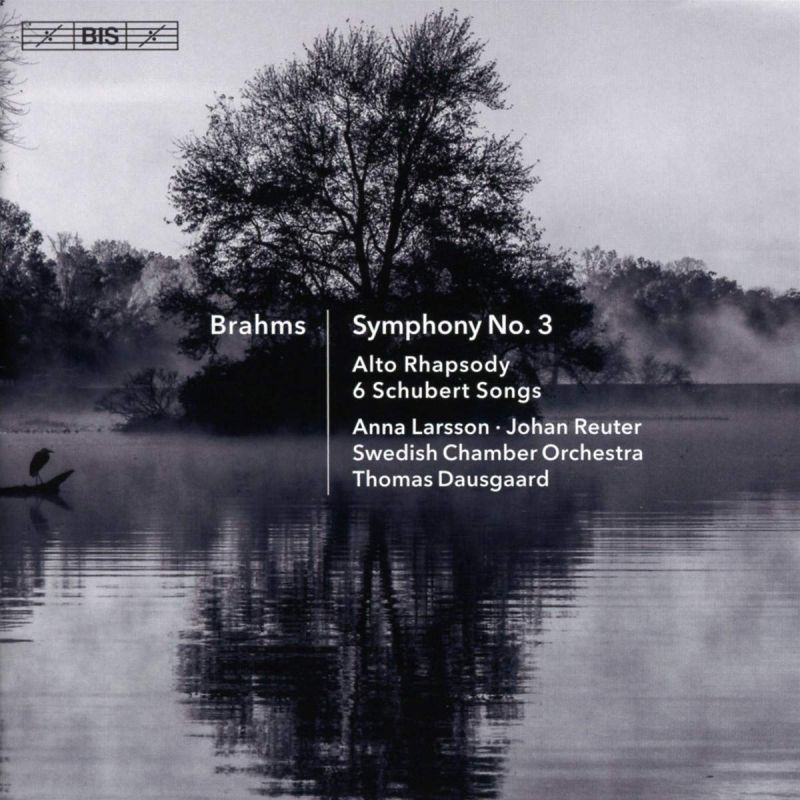BRAHMS Symphony No 3 (Dausgaard)
View record and artist detailsRecord and Artist Details
Composer or Director: Johannes Brahms
Genre:
Orchestral
Label: BIS
Magazine Review Date: 10/2018
Media Format: Super Audio CD
Media Runtime: 78
Mastering:
DDD
Catalogue Number: BIS2319

Tracks:
| Composition | Artist Credit |
|---|---|
| Symphony No. 3 |
Johannes Brahms, Composer
Johannes Brahms, Composer Swedish Chamber Orchestra Thomas Dausgaard, Conductor |
| An Schwager Kronos (Schubert) |
Johannes Brahms, Composer
Johan Reuter, Baritone Johannes Brahms, Composer Swedish Chamber Orchestra Thomas Dausgaard, Conductor |
| Memnon (Schubert) |
Johannes Brahms, Composer
Anna Larsson, Alto Johannes Brahms, Composer Swedish Chamber Orchestra Thomas Dausgaard, Conductor |
| Geheimes (Schubert) |
Johannes Brahms, Composer
Anna Larsson, Alto Johannes Brahms, Composer Swedish Chamber Orchestra Thomas Dausgaard, Conductor |
| Greisengesang (Schubert) |
Johannes Brahms, Composer
Johan Reuter, Baritone Johannes Brahms, Composer Swedish Chamber Orchestra Thomas Dausgaard, Conductor |
| Ellens Gesang II (Schubert) |
Johannes Brahms, Composer
Anna Larsson, Alto Johannes Brahms, Composer Swedish Chamber Orchestra Thomas Dausgaard, Conductor |
| Gruppe aus dem Tartarus (Schubert) |
Johannes Brahms, Composer
Johan Reuter, Baritone Johannes Brahms, Composer Swedish Chamber Orchestra Thomas Dausgaard, Conductor |
| (21) Hungarian Dances, Movement: Nos 11-16 |
Johannes Brahms, Composer
Johannes Brahms, Composer Swedish Chamber Orchestra Thomas Dausgaard, Conductor |
| Alto Rhapsody |
Johannes Brahms, Composer
Anna Larsson, Alto Johannes Brahms, Composer Swedish Chamber Orchestra Swedish Radio Choir Male Voices Thomas Dausgaard, Conductor |
Author: Andrew Mellor
Throughout the opening Allegro, the feeling persists that the source of the music’s momentum is not as organic as it could or should be – that sometimes it’s too obviously coming from the forcing hand of the conductor. The best movement is the last; not over-driven (unlike the Andante) and benefiting from the cut-through of the winds, especially in those pivotal moments when they control of the agenda. As before, the SCO are delectable when the textures become polyphonic but, in this emotionally heavier work, it can be frustrating when that polyphony isn’t paid off with real churning depth (especially from the strings).
None of that stops this series being ever illuminating and an added benefit here is in the generous fill-ups. Dausgaard’s own orchestrations of the Hungarian Dances Nos 11 16 are infectious, by turns rustic and syrupy (the conductor’s trademark push-and-pull is at its mesmerising best in No 16). There’s a slight lack of repose in the tight choral sound of the Alto Rhapsody, where a larger, more breathy, amateur chorus would offer more of a blanket embrace than the men of the Swedish Radio Choir. Anna Larsson is a little blustery in the rhapsody and can be approximate in her contribution to three of Schubert’s Six Songs in Brahms’s arrangement, but Johan Reuter’s three make a huge impact. His Beethovenian insistence and focus in ‘An Schwager Kronos’ is thrilling and the colour gradations in his ‘Griesengesang’ – over grainy low winds and strings – is remarkable. All of this is worth hearing; Reuter’s singing, totally united with the orchestra, is rather more.
Discover the world's largest classical music catalogue with Presto Music.

Gramophone Digital Club
- Digital Edition
- Digital Archive
- Reviews Database
- Full website access
From £8.75 / month
Subscribe
Gramophone Full Club
- Print Edition
- Digital Edition
- Digital Archive
- Reviews Database
- Full website access
From £11.00 / month
Subscribe
If you are a library, university or other organisation that would be interested in an institutional subscription to Gramophone please click here for further information.




